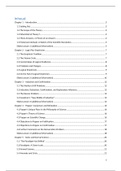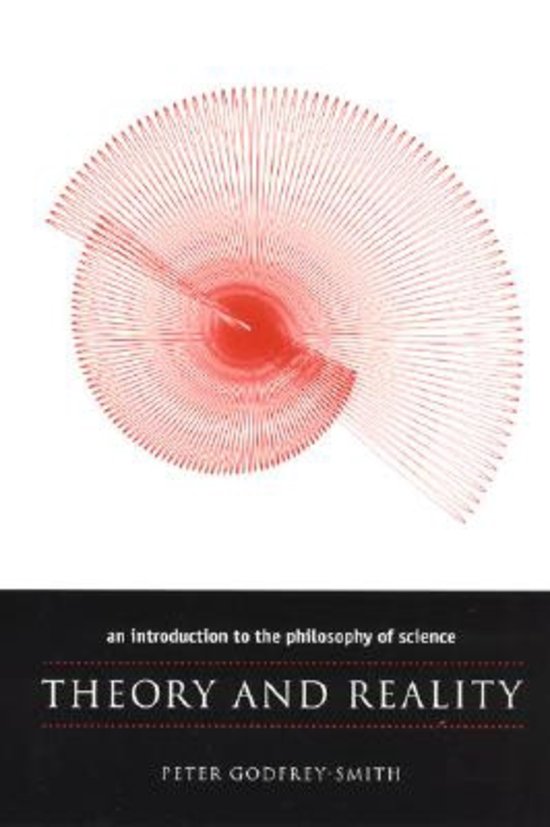Inhoud
Chapter 1 – Introducton........................................................................................................................3
1.1 Setni gut....................................................................................................................................3
1.2 The Scope of the Theory...............................................................................................................3
1.3 What Kind of Theory?...................................................................................................................3
1.4 Three Answers, or Pieces of an Answer........................................................................................4
1.5 Historical Interlude: A Sketch of the Scientic cevoluton............................................................5
Slides Lecture 1 (additonal informatonn............................................................................................5
Chapter 2 – Loiic Plus Empiricism..........................................................................................................7
2.1 The Empiricist Traditon................................................................................................................7
2.2 The Vienna Circle..........................................................................................................................7
2.3 Central Ideas of Loiical Positvism................................................................................................8
2.4 Problems and Chanies.................................................................................................................8
2.5 Loiical Empiricism........................................................................................................................9
2.6 gn the Fall of Loiical Empiricism..................................................................................................9
Slides Lecture 2 (additonal informatonn..........................................................................................10
Chapter 3 – Inducton and Conirmaton..............................................................................................12
3.1 The Mother of All Problems........................................................................................................12
3.2 Inducton, Deducton, Conirmaton, and Explanatory Inference................................................12
3.3 The cavens Problem...................................................................................................................13
3.4 Goodman’s “New ciddle of Inductonn.......................................................................................13
Slides Lecture 3 (additonal informatonn..........................................................................................14
Chapter 4 – Popper: Conjecture and cefutaton...................................................................................16
4.1 Popper’s Unique Place in the Philosophy of Science..................................................................16
4.2 Popper’s Theory of Science.........................................................................................................16
4.3 Popper on Scientic Chanie.......................................................................................................16
4.4 gbjectons to Popper on Falsiicaton.........................................................................................17
4.5 gbjectons to Popper on Conirmaton.......................................................................................17
4.6 Further Comments on the Demarcaton Problem......................................................................18
Slides Lecture 4 (additonal informatonn..........................................................................................18
Chapter 5 – Kuhn and Normal Science.................................................................................................20
5.1 “The Paradiim Has Shifedn........................................................................................................20
5.2 Paradiims: A Closer Look............................................................................................................20
5.3 Normal Science...........................................................................................................................21
5.4 Anomaly and Crisis......................................................................................................................21
1
, 5.5 Wrap-up of Normal Science........................................................................................................22
Slides Lecture 5 (additonal informatonn..........................................................................................22
Chapter 6 – Kuhn and cevolutons.......................................................................................................24
6.1 Considerable Upset.....................................................................................................................24
6.2 cevolutons an Their Afermath..................................................................................................24
6.3 Incommensurability, celatvism, and Proiress...........................................................................25
6.4 The X-cated “Chapter Xn............................................................................................................26
6.5 Final Thouihts on Kuhn..............................................................................................................26
Slides Lecture 6 (additonal informatonn..........................................................................................27
Chapter 7 – Lakatos, Laudan, Feyerabend, and Frameworks...............................................................28
7.1 Afer Structure............................................................................................................................28
7.2 Lakatos and cesearch Proirams.................................................................................................28
7.3 Laudan and cesearch Traditons.................................................................................................29
7.4 Anythini Goes............................................................................................................................30
7.5 An Ariument from History That Haunts Philosophy...................................................................30
7.6 Pluralism and the camblinis of Madmen...................................................................................31
7.7 Takini Stock: Frameworks and Two-Process Theories of Science...............................................31
Slides Lecture 7 (additonal informatonn..........................................................................................32
Important Names, Times, etc...........................................................................................................33
The Methodoloiy of Positve Economics (artcle 1n..............................................................................36
2
,Chapter 1 – Introduction
1.1 Setting Out
Philosophy is an atempt to ask and answer some very basic questons about the universe and our
place within it.
Throuihout the later part of the twenteth century, all the ields concerned with the nature of
science went on somethini of a roller-coaster ride. These debates came to be known as the Science
Wars, a phrase that conveys a sense of how heated thinis became. There is stll a ireat deal of
disaireement about even the most basic questons concernini the nature and status of scientic
knowledie.
1.2 The Scope of the Theory
A few have suiiested that theoretcal physics is becomini less scientic than it used to be, as it is
evolvini into an esoteric, mathematcal model-buildini exercise that has litle contact with the real
world. And molecular bioloiy has recently been acquirini connectons with business and industry
that make it, in the eyes of some, a less exemplary science that it once was. People constantly ariue
which kinds of intellectual work count as science.
The word science is derived from the Latn word Scientia, which referred to the results of loiical
demonstratons that revealed ieneral and necessary truths. gver tme, the term science came to be
used for work with closer links to observaton and experiment, and the associaton between science
and an ideal of conclusive proof receded.
To understand science, we need to distniuish it from other kinds of investiaton of the world. We
choose to use the word “sciencen, thus we should try to develop both
- A ieneral understandini of how humans iain knowledie of the world around them and
- An understandini of what makes the work descended from the Scientic cevoluton diierent
from other kinds of investiaton of the world
1.3 What Kind of Theory?
Within the philosophy of science, we can distniuish between epistemological issues and
metaphysical issues.
- Epistemoloiy is the side of philosophy that is concerned with questons about knowledie,
evidence, and ratonality (most of the issues discussed in this bookn.
- Metaphysics deals with ieneral questons about the nature of reality.
We will have to deal with disaireement about the riiht form for a philosophical theory of science,
and disaireement about which questons philosophers should be askini. gne obvious possibility is
that we miiht try for an understandini of scientific thinkiing. In the 20th century, many philosophers
rejected this idea, insistni that we should try to understand the abstract structure of scientic
theories and the relatonships between theories and evidence – the logical theory of science. A third
opton is that we should try to come up with a methodology, a set of rules or procedures that
scientsts do or should follow.
A descriptive theory is an atempt to describe what actually ioes on, or what somethini is like,
without makini value judiments.
A normative theory does make value judiements; it talks about what should io on, or what thinis
should be like.
The term “objectiven has become a slippery one, used to mean a number of very diierent thinis:
3
, - The absence of bias; objectvity is impartality or fairness
- Express claims about whether the existence of somethini is independent of our minds
When lookini for a recipe (the scientic methodn tends to be too simplistc, and lookini for a loiical
theory is too abstract, we can try to describe the scientic strategy for investiatni the world.
1.4 Three Answers, or Pieces of an Answer
Three diierent answers to our ieneral questons about how science works:
1. Empiricism
o Encompasses a diverse family of philosophical views, and debates within the
empiricist camp can be intense.
o “The only source of real knowledie about the world is experiencen
o A view about where all knowledie comes from, not just scientic knowledie.
o Tended to see the diierences between science and everyday thinkini as diierences
of detail and degree.
o Generally tended to construe science in a broad way and to approach questons in
the philosophy of science from the standpoint of a ieneral theory of thouiht and
knowledie.
o Pro-science
o It provides for a direct connection with reality in terms of seeini, hearini, etc.
Seeini is believini!
o There was no fundamentally new approach to investiaton discovered durini the
Scientic cevoluton.
o Example: Cholera – John Snow
Empiricism and Science: Scientic thinkini and investiaton have the same basic patern as
everyday thinkini and investiaton. In each case, the only source of real knowledie about
the world is experience. But science is especially successful because it is orianized,
systematc, and especially responsive to experience.
2. Mathematics
o gfen been used to ariue aiainst empiricism; of course knowledie is based on
experience, but that tells us nothini about what diierentates science from other
human thouiht.
o What makes science special is its atempt to quantfy phenomena and detect
mathematcal paterns in the fow of events.
o Mathematcs used as a tool within an empiricist outlook is what makes science
special.
o Philosopher: Galileo (althouih he was also empirical mindedn
Mathematcs and Science: What makes science diierent from other kinds of investiaton,
and especially successful, is its atempt to understand the natural world usini mathematcal
tools.
3. Social structure – communities
o Almost every move that a scientst makes depends on elaborate networks of
cooperaton and trust.
o Cooperaton and lineaies of transmited results are essental to science.
o Shapin ariues that a iood theory of the social orianizaton of science will be a beter
theory of science that empiricist fantasies.
Social Structure and Science: What makes science diierent from other kinds of investiaton,
and especially successful, is its unique social structure.
4





